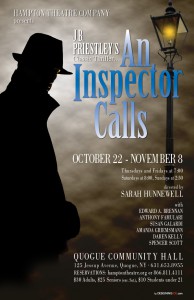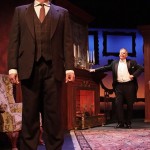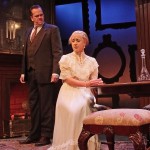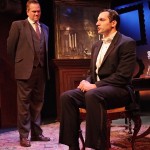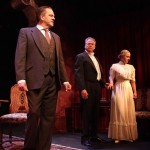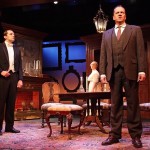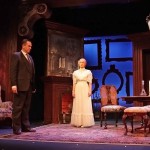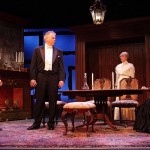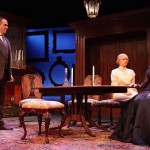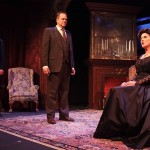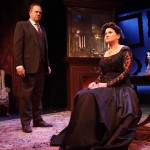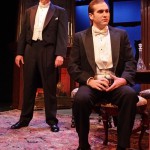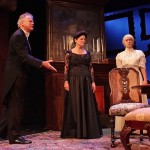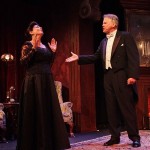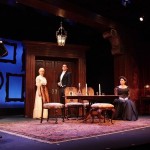An Inspector Calls
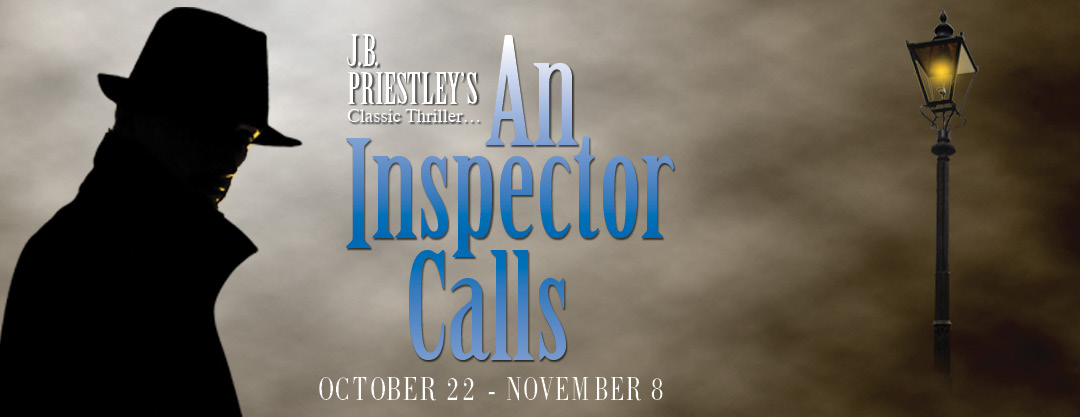
CAST:
Inspector Goole – EDWARD A. BRENNAN
Gerald Croft – ANTHONY FAMULARI
Sybil Birling – SUSAN GALARDI
Sheila Birling – AMANDA GRIEMSMANN
Arthur Birling – DAREN KELLY
Eric Birling – SPENCER SCOTT
MORE ABOUT THE PLAY/PLAYWRIGHT
It is 1912 in industrial northern England, the unsinkable Titanic has just set sail, the British Empire is safe and secure, and the prosperous Birling family is spending a happy evening celebrating the engagement of their daughter Sheila to Gerald Croft, a young man who ensures a marriage “made in heaven,” both financially and socially. Yet, just when life seems serene and unassailable in the Birling world, a mysterious Inspector Goole appears claiming to be investigating the shocking suicide of a lovely young woman.
2015 marks the 70th anniversary of the opening of J. B. Priestley’s classic thriller, a work that is accusatory, tense and filled with the playwright’s scathing views on the hypocrisies of Victorian/Edwardian English society. The rich and the powerful, argues Priestley, must be saved from themselves. Such an argument remains eerily applicable today and a frisson of recognition is inevitable as audiences realize the timely relevance of Priestley’s words.
—
John Boynton (J.B.) Priestly, a native of Yorkshire, England, was a novelist, broadcaster and playwright, but it is the latter role at which he achieved his greatest success, writing numerous plays and dramatic adaptions, the most well-known among which is An Inspector Calls (1945), followed by his other “Time Plays” (plays influenced by J.W. Dunne’s theory of time), Dangerous Corner (1932), Time and the Conways (1937) and I Have Been Here Before (1937). An Inspector Calls combines his fascination with the nature of time, and the way the choices we make affect the outcomes of our lives, with his scathing opinions of society. Priestley also enjoyed international success with more comedic material such as his early hit, Laburnum Grove (1933) and later, When We Were Married (1938). During World War II, Priestley achieved the peak of his fame and influence with his BBC “Postscripts” broadcasts, second in popularity only to those of Winston Churchill. Satirist, philosopher, humorist, time-theorist, political and social pundit, and a great man of letters, Priestly was offered a knighthood and a peerage, both of which he refused. He did accept the Order of Merit in 1977.
EDWARD A. BRENNAN (Inspector Goole) has appeared with the Hampton Theatre Company as Angus in The Drawer Boy, Joe Foster in Becky’s New Car, Arbuthnot/Arundel in The Enchanted April, Chief Bromden in One Flew Over The Cuckoo’s Nest and Ralph in Frozen. His favorite professional acting credits include the title roles in Phantom and Jekyll & Hyde, Owen in Voices In The Dark, Ross in Visiting Mr. Green, Beast in Beauty And The Beast, Albin (ZaZa) in La Cage Aux Folles, Professor Callahan in Legally Blonde, and Archibald in The Secret Garden. Ed also directed the HTC’s productions of Deathtrap and I Hate Hamlet. He holds a Masters degree in Theater and has directed over 40 productions on Long Island.
ANTHONY FAMULARI (Gerald Croft) made his HTC debut last spring as Sandy Tyrell in Hay Fever. Anthony studied theater at Stony Brook University and the Lee Strasberg Theatre and Film Institute. In addition to roles in a number of independent films, his stage credits include Rich in Sailor’s Song, Epilogue in The Flu Season, The Schoolmaster in Figaro/Figaro and Constantine in Big Love. A huge thank you to Sarah and to everyone at HTC. And a big thanks to my family for their love and support!
SUSAN GALARDI (Sybil Birling) is thrilled to work with the HTC. Regional theater credits include Miss Maudie, To Kill a Mockingbird, Bay Street; staged readings at Guild Hall: Mag Folan, Beauty Queen of Leenane; Kate Mundy, Dancing at Lughnasa; and Juno, Juno and the Paycock. Susan appeared in her original award-winning musical, Living Proof, at Wings Theatre; in her children’s musical, Natalie Spoo, produced at CMEE; and in NYC in her one-woman show directed by Betty Buckley. She wrote and performed sketch comedy throughout the Northeast, and appeared on “Late Night with Conan O’Brien” and Comedy Central. Susan is a graduate of Carnegie Mellon and the Manhattan School of Music. Love to Beth and Hudson for their support.
AMANDA GRIEMSMANN (Sheila Birling) is thrilled to return to the Hampton Theatre Company following her appearances as Jackie Coryton in Hay Fever and Myrtle Mae Simmons in Harvey. A Long Island native, she received a B.F.A. in theater from Adelphi University. She has performed for several seasons in Manhattan with The Inwood Shakespeare Festival. Her other favorite credits include: Steel Magnolias, Arsenic and Old Lace, Don’t Dress For Dinner, Hamlet Q1, and The Crucible. She most recently performed with The Lafayette Salon Series, a monthly reading series that meets at The Players Club. A special thanks to Sarah for this opportunity! Love to friends and family, physically and spiritually, for their constant support and encouragement.
DAREN KELLY (Arthur Birling) was featured on Broadway in Deathtrap, Woman of the Year, Crazy for You and South Pacific (NYC Opera); toured the nation as Julian Marsh in 42nd Street and Reverend Moore in Footloose; played the Chorus to Al Pacino’s Oedipus; is very proud of his participation in Trouble in Mind at Arena Stage,Yale and Centre Stage. Daren has performed Shakespeare and modern classics at Long Wharf, South Coast Rep., Repertory Theatre of St. Louis, Asolo, Alliance, Bay Street, Shakespeare NJ, Great Lakes, Westport, Cape and Alaska Rep. TV & film: Kingdom Coming, Law & Order, Trueblood, MASH, Love Hurts, Tales from the Dark Side and All My Children.
SPENCER SCOTT (Eric Birling) is very excited to be making his debut with HTC. He studied drama at Syracuse University and currently studies acting at HB Studios in Manhattan. He guest starred in the Discovery ID show “Young, Hot, and Crooked” and has appeared in several independent films. Theater credits include, A Christmas Carol (Young Scrooge), A Midsummer Night’s Dream (Demetrius) and Sextortion (Donny) which won Best Ensemble at the Fresh Fruit Festival in 2013. Spencer recently performed in the new play God, Sex and Getting Even as Rusty. A big thank you to Sarah and HTC for a chance to work with you! And all my love to my friends and family for your support!
JOHN BOYNTON (J.B.) PRIESTLEY (Playwright), a native of Yorkshire, England, was a novelist, broadcaster and playwright, but it is the latter role at which he achieved his greatest success, writing numerous plays and dramatic adaptions, the most well-known among which is An Inspector Calls (1945), followed by his other “Time Plays” (plays influenced by J.W. Dunne’s theory of time), Dangerous Corner (1932), Time and the Conways (1937) and I Have Been Here Before (1937). An Inspector Calls combines his fascination with the nature of time, and the way the choices we make affect the outcomes of our lives, with his scathing opinions of society. Priestley also enjoyed international success with more comedic material such as his early hit, Laburnum Grove (1933) and later, When We Were Married (1938). During World War II, Priestley achieved the peak of his fame and influence with his BBC “Postscripts” broadcasts, second in popularity only to those of Winston Churchill. Satirist, philosopher, humorist, time-theorist, political and social pundit, and a great man of letters, Priestly was offered a knighthood and a peerage, both of which he refused. He did accept the Order of Merit in 1977.
SARAH HUNNEWELL (Director) has directed many shows for the Hampton Theatre Company; favorites include Time Stands Still, The Drawer Boy, Rabbit Hole, The Enchanted April, One Flew Over The Cuckoo’s Nest, The Oldest Living Graduate, Fuddy Meers, Summer and Smoke, The Rainmaker and The Foreigner. She is also the Jill-of-all-trades otherwise known as the Executive Director of the HTC. Many thanks to her excellent cast and crew for their hard work on this production and to our audience members, patrons and all the people who help make our work possible.
PETER-TOLIN BAKER (Set Designer) is the founder and principal designer of NYC based P-T B Design Services and, as such, provides creative visual design solutions for a range of retail brands, exhibitions and promotional events. Previously, he was the Vice President of Visual Merchandising at Tiffany & Co. and the visual manager with the legendary luxury emporium Henri Bendel. Additional design experience, in California, includes clothing design for Japanese Weekend and design and construction for E.M. Fabrications, a custom display and prop company. Baker was also both production designer and performer with the groundbreaking band Voice Farm. Throughout his career Baker has continued to work as scenic designer for dozens of dramatic and musical productions, including local HITFest’s recent productions of In the Next Room or the vibrator play, A Midsummer Night’s Dream, and In The Bar of a Tokyo Hotel. He designed the sets of Clybourne Park and Hay Fever for the Hampton Theatre Company.
SEBASTIAN PACZYNSKI (Lighting Designer) first worked with the Hampton Theatre Company when he designed the company’s 2003 production of Summer and Smoke at Guild Hall and has designed all the company’s productions since Proof in 2004 as well as the theater’s new lighting system. He has designed lighting for theater, dance and special events in a number of Broadway, Off Broadway, Off Off Broadway and regional venues. He has also worked in film and television as the director of photography. He has designed numerous productions for Guild Hall and for the Hamptons Shakespeare Festival.
DIANA MARBURY (Set Decor, Properties) would like to thank all the people and businesses that provide the furniture, decorations, and props for each show. Also, a big hand to our wonderful patrons for their continued support. Diana has appeared in 50 HTC productions, most recently Hay Fever (Clara), The Foreigner (Betty Meeks) and Other Desert Cities (Polly Wyeth) and directed last season’s productions of Hay Fever and Harvey as well as God of Carnage, How the Other Half Loves, Black Tie and ‘Art’.
TERESA LEBRUN (Costume Designer) is the resident costumer for the Hampton Theatre Company and has designed costumes for all the company’s recent productions. Teresa has also costumed for Spindletop Productions at Guild Hall. Much love to her boys Josh and Noah.
CHRISSIE DEPIERRO (Stage Manager). In her third season with HTC she steps into the shoes of stage manager. Many thanks to our unbelievably talented cast, director, lighting, set and costume designers. It’s because of all of you that we make magic happen. To Matthew, Kristopher and Theresa, it’s your never ending love and support that has made a dream come true.
MARYAM (Rob) DOWLING (Lighting & Sound Technician) has done lighting and sound for 22 years with various theater groups on the East End. Maryam has also helped Sebastian with lighting setup at Guild Hall, the Ross School, and other local venues. This is Maryam’s seventh season with the Hampton Theatre Company and she is very happy to be part of the show and the company.
Shadows in the Drawing Room
by Bridget LeRoy The East Hampton Star Written by one of Great Britain’s foremost men of letters, J.B. Priestley, “An Inspector Calls” is the Hampton Theatre Company’s first production of its 31st season, and a good choice it is. Full of profundity and more twists than a Bimini knot, the play is a riveting revival of an all-time classic. In a nutshell, a mysterious police inspector shows up at the engagement dinner of an upper class British family to interrogate everyone there, any one of whom, he explains, may have had a part, however small or seemingly insignificant, in the horrific suicide of a local girl. If the play had ever been adapted into a Frank Capra movie, it might have been titled “It’s a Horrible Life.” If it were written today, it might be called simply “Karma Is a Bitch.” Arthur and Sybil Birling, an industrialist and his wife in the fictional town of Brumley, are celebrating the engagement of their daughter, Sheila, to Gerald Croft, the son of Arthur’s competitor. The Birlings’ son, Eric, is also in attendance. At this point, the playwright could have easily set up a simple and fluffy drawing room comedy à la Noel Coward — shallow self-absorption clearly abounds in the Birling household. But Priestley, who wrote “An Inspector Calls” on the tailcoats of World War II, chose to set his work only a few days before the Titanic is scheduled to set sail. [HTC correction: The play is set on the evening that the Titanic sank.] Even though the ship is only mentioned in passing as a wonder of the age and “absolutely unsinkable,” it sets the audience up to see that a catastrophe of mammoth proportions, however unrelated, lies ahead. “Keep your head down and concentrate on your own business… every man for himself,” Mr. Birling advises his future son-in-law, moments before the mysterious Inspector Goole shows up like an iceberg to crash the party. And to throw one more Titanic image into the mix, Sarah Hunnewell, the director, has steamlined — uh, streamlined — the script into a gripping two acts instead of the traditional three somewhat stodgy ones. The inspector shows each person how the smallest unkindness can have huge repercussions on the life of a single individual. “We don’t live alone. We are members of one body. We are responsible for each other,” he tells them, the polar opposite of Mr. Birling’s previous words. It would have been a quaint little whodunit to simply end with everyone being involved, sort of a pint-sized “Murder on the Orient Express.” But there’s more, and that is what gives “An Inspector Calls” its power. “I think the inspector did it,” a woman behind us told her companion loudly in her best Lawn Guyland accent during the second act. My companion whispered, “Not. Getting. It.” The cast is absolutely exemplary. Daren Kelly blusters like a puffed up peacock as the head of household, Arthur Birling, a last bastion of male sacrosanctity who toasts to “lower costs and higher prices.” Susan Galardi is completely believable as the matriarchal Sybil, the resentful high class dowager queen who sticks to her guns until the very end. Amanda Griemsmann plays the engaged Sheila with a lovely sheen beneath the frippery, bringing enough humanism to her role to instill a hope for the “future” generation. As her fiancé, Anthony Famulari is able to subtly express his vulnerability while maintaining his aristocratic air. Spencer Scott, a newcomer to HTC, shows an impressive range as the quietly drunken son, Eric. And as the inspector, Edward Brennan nails it. He is able to chastise the family members for their awful behavior in a few words, while also managing to bring a certain lightness to the role, almost verging on the comedic. Lighting, costumes, and sets by Sebastian Paczynski, Teresa LeBrun, and Peter-Tolin Baker provide the perfect and sumptuous setting for the goings on, along with a somewhat surreal backdrop that adds to the discomfiture happening center stage. “An Inspector Calls” has everything — first and foremost, a very strong production right here in Quogue, and second, a story with a fascinating layered and ambiguous meaning. But even more than that, the play itself has a rich history, with its first production not in London but in Leningrad. Priestley’s socialist views were not popular with Winston Churchill and others sitting in the catbird seat, although the party line is that no theaters in the West End were available. When the show did premiere a year later in 1946, the cast included Ralph Richardson, Margaret Leighton, and Alec Guinness. Oh, to have been a member of that first audience! But the past is done. Or is it? The next best thing is getting to Quogue to see “An Inspector Calls,” at the Hampton Theatre Company through Nov. 8. And to remember the words of George Santayana, a contemporary of Priestley’s, who reminded us that those who cannot remember the past are condemned to repeat it.Theater Review: ‘An Inspector Calls’ Thrills in Quogue
by Brendan O’Reilly Dan’s Papers Quogue’s Hampton Theatre Company has started off its 31st season strong with a suspenseful production of An Inspector Calls by British playwright J.B. Priestley. Though this social critique debuted 70 years ago, Priestley’s indictment of the haut monde’s indifference to the plight of the working class is as impactful and relevant as ever. Taking place in England at the home of the affluent and influential Birling family on April 15, 1912—the night the Titanic sank—An Inspector Calls opens pleasantly enough, as the family enjoys after-dinner drinks and toasts an engagement. Arthur Birling (Daren Kelly) and wife Sybil (Susan Galardi) are delighted their daughter, Sheila (Amanda Griemsmann), will marry Gerald Croft (Anthony Famulari), who himself is from a prosperous family. Their son, Eric, (Spencer Scott) is enjoying more drinks than he should, as he is wont to do. The quiet evening is soon shaken up when the title character arrives to inquire about the suicide of a young woman. Immediately upon entry as the mysterious Inspector Goole, Edward Brennan commands the stage. Confident and purposeful, Goole is there for answers and it’s clear he won’t be going anywhere until he has them. But what could the Birlings and Gerald have to do with a woman who is beneath their station, and what could her suicide have to do with any of them? The audience sits rapt waiting to find out as Goole, in his deliberate and peculiar manner, subjects each individual, one-by-one, to an unsettling and accusatory line of questioning. As much as the Birlings—and the audience—try to keep up, Goole always remains one step ahead, holding back what he knows until precisely the most impactful moment. As the mystery unfolds, it’s clear that Priestley has packaged a message in this play: Have compassion. Griemsmann excels as Sheila, who becomes the most visibly distraught Birling when it is her turn for Goole to give her a reality check. Brennan’s performance makes it easy to root for Goole, even when the inspector is smug or borderline mean-spirited. Director Sarah Hunnewell, rightly, kept An Inspector Calls taut, with no lulls once Goole steps on stage and no chance for interest to wane. The set by designer Peter-Tolin Baker and decorator Diana Marbury is gorgeous and makes the Quogue stage seem so much larger than it is, drawing the audience into the Birling dining room as the family members are forced to take hard looks at themselves.“An Inspector Calls” review: Brit thriller in Quogue
by Steve Parks Newsday “An Inspector Calls” opened in the Soviet Union in 1945 after producers were unable to find a suitable theater in the United Kingdom so soon after the surrender of Germany ended World War II in Europe. The irony of premiering in Moscow and Leningrad could hardly have escaped its author, English dramatist J.B. Priestley, whose political sympathies aligned with socialist causes. Mistreatment of the proletariat by the privileged class becomes shockingly evident in this deft abridged version of Priestley’s best-known play, smartly directed by Sarah Hunnewell for the Hampton Theatre Company. We meet the prosperous Birlings in their upper-class English dining room (Peter-Tolin Baker’s richly appointed set) on the occasion of their daughter’s engagement to a scion of another prominent family. Arthur, the Birling patriarch, speaks glibly of “peace and prosperity.” The time is 1912, before The Great War to End All Wars. They’ve barely finished their toasts when Inspector Goole is announced. Played by Edward Brennan with peremptory authority burnished by an accusatory glare, Goole is investigating the suicide of Eva Smith. He shows Eva’s photograph to each Birling and their prospective in-law. They all, apparently, played a role in circumstances that led to the working-class girl’s demise. Arthur, played with imperious bluster by Daren Kelly, fired Eva in a labor dispute amounting to three shillings a week. She finds another job in a dress shop where bride-to-be Sheila got her fired over a misperceived slight. Next, it’s Gerald’s turn. Sheila’s fiancé met Eva, aka Daisy, at a bar. Struck by her beauty, Gerald kept her as a mistress before breaking it off. Sybil, the matriarch, portrayed by Susan Galardi with the brittle entitlement of a woman whose social station outranks her husband’s, denied Eva the charity she desperately sought. Last to be interrogated is Eric, the Birlings’ youngest, whose drunken behavior was the final blow in their shared assault on Eva. But is Goole who he appears to be? And have the Birlings learned any lessons? Certainly not the elders. But Amanda Griemsmann’s Sheila convinces us with tearful remonstrations that there’s hope for the younger generation. Gerald, still the hopeful suitor as played as Anthony Famulari, and even dissolute Eric (Spencer Scott) are resolutely remorseful. Yet whenever you think you have it figured out, “Inspector” throws another curve.“An Inspector Calls”: A Sermon Served Straight By Hampton Theatre Company
by Lorraine Dusky Southampton Press and East Hampton Press “Socialist British playwright” as a crossword clue, nine letters, would yield up “Priestley” to the elder educated class, though younger puzzlers would likely be stumped. J.B. Priestley—journalist, novelist, playwright, broadcaster—is not well known in America today, but was famous across the pond from the 1940s to the 1970s for his biting commentary on English society. Think Bernie Sanders penning an ostensibly polite drama about income inequity and you have the feel of Priestley’s 1945 play, “An Inspector Calls,” the Hampton Theatre Company’s season opener at Quogue Community Hall, staging through November 8. Set in 1912—the night before the Titanic sank and the dawn of “Downton Abbey”—the play is a vehicle that examines the smooth and untroubled existence of a haute bourgeoisie British family unconcerned about those less fortunate. But their tranquil way of life is soon to be uprooted by the changing times, along with the rise of the labor movement. As written, “An Inspector Calls” is a well made psychological period piece that becomes a full-frontal attack on merchants and moguls today who won’t raise, say, fast-food workers’ salaries to $15 per hour. In Edwardian England, the demanded wage hike is from 22 to 25 shillings a week. Unthinkable! The action unfolds in a fictitious town in northern England where the Birling family is celebrating the fortuitous engagement of daughter Sheila to the scion of an another even-more-successful manufacturing family, Gerald Croft, with toasts and plenty of pomp. Showcasing their good fortune, the men are in tails, the ladies in fancy dress. Such a happy circumstance of this self-satisfied crew is brusquely interrupted by a mysterious detective, Inspector Goole, who bursts in to question them about the recent suicide of a young woman, Eva Smith—she would be “Jane Doe” in America. Her troubles began when the patriarch of the Birling clan, Arthur, sacked her from the factory for being one of the agitators for higher wages. Thus poor Eva falls on hard times and bad men before she drinks disinfectant and dies. But who is this Inspector Goole? He isn’t acting like a regular policeman, and how does he know so much about everyone? Did Eva really leave such a detailed diary that he claims to have found? And why is he so accusatory? None of them actually poured the cleaning fluid down Eva’s throat. Is he real, or a specter—a stray Ghost of Christmas Future who wandered in? If you are looking for clues, note his name: Goole, pronounced “ghoul.” Drink the postprandial port while ye may, but Goole/Ghoul will get you. Before the final curtain, all will be implicated. The drama itself has the subtlety of your neighbor’s leaf blower when you are about to nap, but is given its due here with an exceptional production. Unlike the 1994 revival on Broadway, celebrated for its technical razzle-dazzle and accompanying music, this is the sermonizing play taken neat. But neat is not a bad word here. What we get is good theater without noisy bells and whistles. The action in this whodunit unravels at the home of the Birling family, and set designer Peter-Tolin Baker has given us a drawing room to delight, with looming wooden rafters and majestic doors, lush red velvet and high-backed caned chairs, punctuated with a gilded telephone. A series of back-lit frames evokes family portraits, or second- or third-rate old masters. We’ve come to expect handsome sets in Quogue; this one is especially swell. Edward A. Brennan, a steam engine of a man, is commanding and intimidating as Inspector Goole, weaving the threads of this family’s responsibility for Eva’s suicide. Susan Galardi is Sybil Birling, the haughty wife and mother; Amanda Griemsmann is Sheila Birling, the newly engaged daughter who turns out to have a moral center; Anthony Famulari is Gerald Croft as her betrothed; and Spencer Scott is the wastrel son. All are excellent and work together well, but it is Daren Kelly as the smug and self-righteous Arthur Birling who dominates. Mr. Kelly has ample acting credits, from Broadway to film and television. Here he projects all the aplomb of a man hoping for a knighthood while skimping on the salaries of lowly factory workers. He convincingly spouts lines that could be written by Donald Trump about “how a man has to look after himself” rather than worry about the economic concerns of others. Everywhere you turn, Priestley’s preachy socialism is leaking out of the script. Well, why not? Especially today, given the enormous financial inequities between master/owner and employee/peon, we could use some stiff medicine in our theater. The play’s history reflects the socialist theme. It was first produced in Russia in 1945 because, as the story goes, a theater could not be found in London and Priestley’s Russian translator found suitable venues in Moscow and Leningrad. Did Stalin applaud? We’ll never know, but it’s a fair guess that the play cut too close to the bone for the British theater-going crowd of the era until it was done elsewhere. Londoners saw it the following year, and it came to Broadway in 1947 where it lasted less than three months. For a post-war crowd, it was probably too depressing. Stephen Daldry’s revival in the 1990s, both in London and then on Broadway, brought the play out of mothballs. With unions currently in deep decline, with economic disparity on the political radar, “An Inspector Calls” has the same relevance it did when Priestley wrote it. Last month, BBC aired its 90-minute film version. You’ve got to hand it to director Sarah Hunnewell for staging a play that would make any of the one-percenters who might be in the audience here uncomfortable. She chose well. Remaining cast includes Chrissie DePierro as Edna, the maid. Costumes by Teresa LeBrun. Lighting by Sebastian Paczynski. Set décor by Diana Marbury.Who-Done-It Turned Humanist Tale Lights Up The Quogue Stage
by Beth Young East End Beacon The line between a criminal act and morally objectionable behavior can be a thin one, but the space surrounding that line is ripe for theater. The Hampton Theatre Company’s opening play of their 31st season, J.B. Priestley’s “An Inspector Calls,” makes great use of this rich territory, serving up a cautionary story of the interconnected web of humanity, disguised in a rich package of intrigue. As the aristocratic Birling family sits down to celebrate the engagement of their daughter on an April evening in the British North Midlands in 1912, a police inspector with the improbable name of “Goole” intrudes on their festivities with the tale of a young woman, Eva Smith, who has just that night killed herself by drinking a disinfectant, burning up her insides. Inspector Goole seems, like Peter Falk’s Columbo, to already know exactly what has happened. It’s the coaxing out of confessions, the why-did-it, that keeps the audience in suspense in this well-crafted play, which seems to have benefited from director Sarah Hunnewell’s work tightening up the script. It turns out, we find, that every member of this little engagement party had played some role in Eva Smith’s death, and all turn in fine performances, obviously enjoying their roles. Edward A. Brennan, as Inspector Goole, is, well, ghoulish, with a stiff neck and his hands held almost locked against his sides, a penetrating stare boring through each member of the household in turn, each in succession even more afraid as he turns his eyes to them for questioning. The family patriarch, Arthur Birling, played with aplomb by Daren Kelly, is a stiff industrialist, with no apologies and no second thoughts for his actions in an every-man-for-himself world. His wife Sybil, finely played with haughty indigence by Susan Galardi, also has no apologies for anything she’s done. It’s their children, the impressionable ones, who watch in horror as the story of Ms. Smith’s short and sad life unfolds. Each of them, in turn, seems to have become a different person over the course of the evening, as they each learn how their own careless actions helped drive Ms. Smith to her death. Sheila Birling, played by Amanda Griemsmann, seems to become a ghost herself as she learns that her careless words to a shopkeeper had a role in Ms. Smith’s death. At the start of the show, she seems a careless, flirty lass, but by the end she becomes the conscience of this sad crew. Her new fiancé, Gerald Croft, played by Anthony Famulari, seems to age years in the telling of his role in Ms. Smith’s suicide. Spencer Scott as Sheila’s younger brother Eric seems a carefree, wisecracking young man, but when he is revealed as a secret drunk with perhaps the largest secrets of all, his parents waste no time building a web of denial and excuses for his bad behavior. All this intrigue and moralizing sounds heavy, but this play is really quite funny. It’s funny because of the way we can clearly see the absurdity of all of our fragile conditions through the lens of theater — and how we can all view poverty, social class, alcoholism and adultery through eyes clouded with denial when our own lives are thrown into the stakes. The set is a great metaphor: cartoon-scale cornices hold up a house built on a lie, the doorway is like a huge coffin, oversized picture frames to the rear of the stage cast unseen ancestors’ eyes on the action, the picture above the mantel isn’t a picture at all but a huge frosted mirror, the oft-poured bottle of port on the center table overshadows the bottle of whiskey on a sideboard until the characters turn to the side when the questioning gets rough. The curtain opens to the chorus of “Rule, Britannia.” The story, like the mighty unsinkable Titanic, which sank on the evening the events of this play took place, is that of something too big to fail, something which, in the end, couldn’t help but be a victim of its own bravado. We know how the story of the Titanic ended, but the ending of this play is just as suspenseful a life raft tale. It’s well worth taking in.AN INSPECTOR CALLS at The Hampton Theatre Company
by Melissa Giordano Broadway World The old English play An Inspector Calls by J.B. Priestley has had an interesting, long journey. It was first performed in 1945 and then in the UK in 1946 with an opening on Broadway in 1947 that was, strangely, dubbed as “stale”. Over time, interestingly, it has become very successful even winning a couple of Tony awards for its 1994 Broadway revival. You will see why as The Hampton Theatre Company (HTC) has mounted a brilliant production of this riveting story. The tale, set in 1912, centers on the prominent Birling family, headed by Arthur and Sybil, in what is supposed to be a joyous evening celebrating their daughter’s engagement. However, it turns into mayhem as a mysterious visitor knocks on the door. HTC’s incarnation, kicking off their 31st season, is excellently directed by Sarah Hunnewell and boasts a remarkable cast. Edward A. Brennan strongly portrays Inspector Goole, the one who interrupts the Birling’s festivities. Goole is there to interrogate the family in the death of a young woman named Eva (or, Daisy). Mr. Brennan also provides the majority of the laughs, though few, in a serious play. Inspector Goole doesn’t seem to call on the Birling’s to gather new information, but to draw out of them information he already knows; how they collectively yet indirectly contribute to Eva’s death. This could be interpreted as a figurative clash between capitalism and socialism at the time effectively demonstrating Mr. Priestley’s Socialist criticism of the superficial selfishness and hypocrisy of the Capitalist society. For example, among other things, how daughter Sheila, splendidly portrayed by Amanda Griemsmann, got Eva fired from her job for petty, jealous reasons. Or Sybil, the head of a highly respected charity organization, portrayed by Susan Galardi, denying assistance to Eva because she deemed Eva not deserving. While the family is circuitously responsible for Eva’s death, they personify for Mr. Priestley a system that exploits helpless people. Everyone is the ensemble company is truly superb in their respective roles; particularly in the entrancing Act II where there are many twists and turn to this story. Another highlight is Peter-Tolin Baker’s clever set. The evening takes place in the dining room of the Birling’s home. It is gorgeously decorated with a grand table, fireplace, and several posh chairs making the stage seem bigger than it really is. This is enhanced beautifully by Sebastian Paczynski’s lighting and Teresa LeBrun’s stunning costumes. And so, it seems the Hampton Theatre Company’s new season is off to a powerful start with An Inspector Calls. A riveting story and a stellar cast make for a wonderful night of theatre.
The show was a delight and its message couldn’t be more meaningful. Fine acting and great set.
– Annette Green
The show was superb in all aspects: story and adaptation; acting; stage setting and lighting.
– Fred Molod
I loved the play. Great acting. Thanks.
– Priscilla Pochna
We loved the play – and everything about it. It was a perfect choice, the actors were all fantastic, the set wonderful and the director did a first rate job. Thank you, Sarah, for making first rate theater happen out here for so many years.
– Penny Wright, Rogers Memorial Library
Loved the show. Invited two friends to spur their interest and they were delighted. Of course, I spread the word in WhB and Remsenburg and beyond. We are so lucky to have you. Thank you.
– Carol Gristina
Excellent play. Acting was great. Staging was good. Price was right. We will be back again and again.
– Susan Sheftick
Excellent show!!! We were fortunate enough to see it yesterday. Be sure to get your tickets. It’s a must see!!
– Michele Kropp
I loved the show. Keep on providing this wonderful entertainment experience.
– Terry Gioia
Our group of seven all loved the show and agreed it was one of the best plays we have seen in a long time. We really enjoyed the performance, and the performers were absolutely MARVELOUS!!!! Looking forward to the next play.
– Betty Entress
Great job with the play…. Libby and I very much enjoyed it – and it was good seeing you. Still trying to figure out the ending….. Oh well!!!!
– Don Steckler
My friend and I want you to know we think this play was the best we’ve seen in a long time. We absolutely loved it. We think it is a Morality Play and we have fun trying to decide who the Inspector really is. Our plaudits to all of you.
– Ridgie Barnett
Great show – we really enjoyed it!!!!! Everyone around us loved it as well!!
– Joe Pallister
Yes, I really did enjoy the show. It was very well done and all the actors did a great job. Congratulations! Many thanks to you all.
– Diana Malcolmson
Just wanted to let you know that my husband and I and my cousins had a wonderful time at the show on Sunday. This is the second show that we have seen at your theater. The show was professional and we felt like we were at a Broadway show. I already told a few of my friends about the play and we will definitely be going to the other shows that you have scheduled this year. Thanks again for having these great productions.
– Janet Feeney
Just want to tell you that I’ve been wanting to attend your theater productions for quite some time now, but just never got there. Well, I saw your show this past Sunday. What a treat! Everything was wonderful. You certainly have a talented production crew, lovely theater, and the actors…unbelievable! I look forward to many future shows. Thank you for having such a terrific venue so close to home! (I live in Westhampton Beach.)
– Diane Farnum
Love this play! Incredible performances all around!
– Tom Kochie
“An Inspector Calls” is at once a psychological thriller and a morality play. It is as fine a performance as I could imagine of a very underappreciated writer. The cast is fantastic. This is ensemble performance at its best. Edward Brennan is commanding as Inspector Goole. Kudos to Sarah Hunnewell and all involved.
– Fred Volkmer
One of HTC’s truly great productions! A superb cast as well as a beautiful set. Glued to your seats. Don’t miss this one!!
– Donald Gruhn
Congratulations, congratulations, congratulations on a wonderful performance. What a great production… Really impressed by the show, the production values, the play, the performances.
– James Fox
Absolutely loved the play An Inspector Calls…saw it Sunday, November 1. The acting was just perfect. I wanted to jump up to give a standing ovation…just should have done it on my own…sorry I did not. Please pass along how riveting I felt the show was. I hung on every word. It is one of my favorite shows to date (but there have been so many “favorites”). Thank you!
– Judith Pfister
Was fabulous!!!
– Mary I. Hull
I did enjoy the production very much and will spread the word.. Great to have this theatre.
– Fran Burns
another great production we enjoyed.
– Ken Jacoppi
Totally fun and riveting. Thanks for all the superb acting and a still timely play.
– Beth Barth
Wonderful Show. Edward A. Brennan as Inspector Goole was awesome. He has a great smile/smirk that he kept through out the show. And the twist at the end (no spoiler alert here, lol) is excellently done. My husband and I have enjoyed many performances at the Hampton Theatre Company for 20 years. Thank you for another outstanding show.
– Joan Pratz
While all of the actors in this Broadway-bound production are top-notch, Ed Brennan is absolutely mesmerizing as the Inspector. The tension onstage is palpable. Kudos to director Sarah Hunnewell! We really enjoyed this show and highly recommend it to others.
– Pat Killian
We really enjoyed this show. It called to mind “A Christmas Carol”, and just as a “Christmas Carol” has remained so timely since it was first produced, so to does “An Inspector Calls” remain very relevant in today’s world. The actors were wonderful and, as always, the direction and the production were top-notch! Thank you for such a perfect choice for the coming Holiday Season.
– Marilyn Foster Nemec
It was a delightful experience. I will tell my friends.
– Kathleen Powers
The acting was outstanding but I’m still trying to figure out the ending!
– Helen Houdek
I really enjoyed your latest performance of “An Inspector Calls”. It was very well acted and I could understand every word of dialogue even from way back in the theatre. Keep up the good work and I now look forward to the next production!!
– Mary Ellen Deduck
My wife and I greatly enjoy your productions. The quality equals or betters many New York City performances, in my opinion. The stage scenery is always very good, too. We are hoping that, eventually, Hampton Theater Company will expand production to 6 plays per year. Thank you.
– Greg Mercurio
We thoroughly enjoyed the performance yesterday — all six of us!
– Cathy Schwartz
The show was fantastic, I really enjoyed it.
– Jennifer Duque
Another wonderful production with an excellent cast and great set. It was a well paced suspenseful play with many unexpected twists and revelations. How fortunate we are to have your very professional theatre company which consistently offers quality performances. Thank you.
– Beverly Geiger
It was wonderful, and I have spread the word. You all are wonderful, we are so lucky to have the theatre!
– Susan Devinney
Vincent and I enjoyed the performance of “An Inspector Calls.” One of our favorites. The performers were excellent and the stage set up was beautiful. We are looking forward to the next performance coming up.
– Jenny Filingeri
Loved An Inspector Calls. Of course I always enjoy going to your theater!
– Ray Evans
what a wonderful show….well done….everyone was talking about it.
– Billy Paterson
We so enjoyed our evening at the theater watching “an inspector calls ” great to watch well acted and written theater … It was a real treat for us coming from sag harbor well worth it and we brought two friends that have never been to your plays before but say they will be back as I will as well . Thank you for all your effort… it’s so entertaining and fun …
– Linley Whelan
Great show enjoyed by us four. Acting was terrific and the twist at the end was a pleasant surprise. So, looking forward to the rest. Wonderful to have a small theater with so much talent so close by.
– Joan and Ken Maher
You did a phenomenal job, as always. Thank you so much for your hard and devotion to this Theater Company.
– Chris LaGuardia
We loved the show, and I spoke with the director, so she would understand how much we enjoyed the production.
– Charles & Ellen Fishman, Howard & Nahid Rachlin
Great show!
– Mark Catalano
Thoroughly enjoyed the play. The actors were perfect and we especially love Inspector Ghoul!
– John Strong
I enjoyed “Inspector” very much! Very good acting (obviously astute directing) & beautiful sets as always. I brought three friends, new to the Hampton Theater Company. They were delighted with the play & its intrigues. I appreciate your efforts very much!
– Larry Liddle
One of the best. Congratulations.
– Jim Boyle
Just wanted to say that I really enjoyed the show and the hospitality of the people working there. The chocolate chip cookie were amazing also….
– Kathleen Castro
I thoroughly enjoyed this choice of play and casting. A social commentary and most entertaining! Loved the surprise ending.
– Susan Bailey
My husband Bill and I attended the play last Friday evening. The cast was amazing, the set was perfect, and the content of the play was brilliant! We found your production as professional as anything we have ever seen on Broadway. We love The Quogue Community Theatre, please don’t stop doing what you do!! Enthusiastically.
– Susan Siegel
Two friends and I saw this show this past Sunday. It was absolutely fabulous! I retired to the Hamptons five years ago after living and working in NYC for 40 years. While a Manhattan resident I saw Broadway and off-Broadway shows weekly and the calibre of shows that you have been putting on for the past few years are as good or better than some of the B’way shows I saw. Keep up this wonderful record!!
– Judith Bacher
 Hampton Theatre Company
Hampton Theatre Company